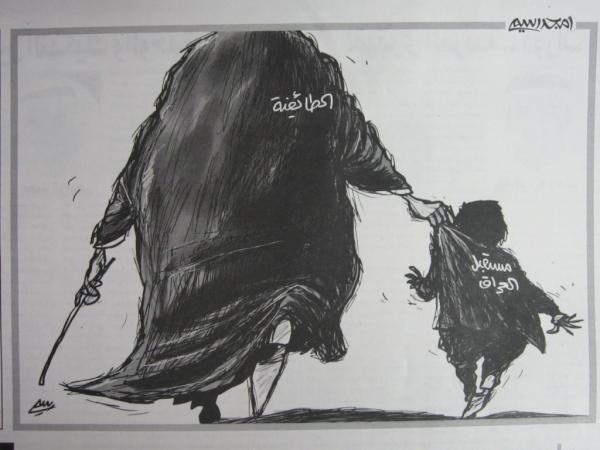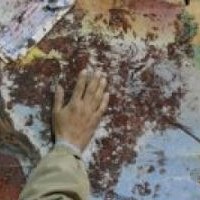![]()
Thu, July 5, 2012 | By Barry Rubin
This article is an improved version of a Jerusalem Post column.

Cartoon from Al-Sharq Al-Awsat newspaper on how sectarianism (the big man) is grabbing Iraq’s future (the little boy). (Image via Wemeantwell.com. Cartoon courtesy of Twitter’s @Kassakhoon)
In the new Middle East where people talk a lot behind the scenes using high-technology communications, we have far more frequent interactions with people who live in countries ostensibly at war with Israel. Such conversations are always interesting and useful for analysts.
Sometimes the exchanges are even happening in public. I’ve been interviewed a number of times, for example, by Iraqi journalists. But this time there was a different kind of question at the end of the interview.
That last query was the journalist’s asking me what message I had for Iraq’s people. For a moment, I was speechless. I’ve been waiting more than 30 years for that kind of opportunity. What should I say that wasn’t just special pleading or an obvious exercise in hasbarah?
But let me start at the beginning. Not long ago I wrote that Iraq might be the best model realistically available right now for the Arabic-speaking world. Iraq dropped out of the seemingly endless and futile race by countries to conquer the region; moved away from radical and disastrous ideology; developed a measure of democracy, pluralism, and federalism; defeated an internal terrorist insurgency that was being helped by its neighbors; and seemed to be pursuing a pragmatic path.
Unfortunately, though, there has been steady deterioration. Prime Minister Nouri al-Maliki is grabbing for supreme power; Vice-President Tariq al-Hashimi has fled, pursued by al-Maliki’s charges of terrorism. President Jalal Talabani was thrust into the middle. What’s important to keep in mind is that the first man is a Shia Muslim, the second is a Sunni Muslim, and the third is a Kurd.
So while these are personal rivalries — not everyone lines up neatly along sectarian or ethnic lines — such disputes also represent communal rifts and could reignite a bloody civil war in Iraq. This is risky.
Then there’s the perennial question of how much influence does Iran have in Iraq? Less than one might expect on the national level, I’d say, but still some real behind-the-scenes power in southern Iraq and a relative ease of interfering in the country. Tehran has apparently instructed its Shia Iraqi assets to support the current government and not make trouble.
So the threat is not high at this point. Still, the Baghdad government is going to be careful to stay on good terms with Tehran. At the same time, though, Iraq’s leaders have no desire to be Iran’s clients, despite some of them having such close ties during the Saddam Hussein era. And so the whole sad tragedy may be starting again.
As Michael Corleoni said, “Just when I thought I was out… they pull me back in.”
What are the diseases of the Middle East that refuse to go away?
- The belief that one country — nowadays mainly Egypt, Iran, and Turkey — think they can dominate the whole region and a willingness to sacrifice blood and treasure to do so.
- Instead of fixing problems, hate is focused on scapegoats.
- The assumption that one ideology — formerly Arab nationalism, now Islamism — can conquer everyone and everywhere.
- The conclusion that one can only be a leader by being a dictator.
- The rejection of pluralism, freedom, pragmatism, and the emphasis on political power maneuvers over socio-economic development.
Whatever its shortcomings, Europe overcame these maladies. Many in Asia are doing so, as are some leaders and countries elsewhere. In the Middle East, though, while there are hints of enlightenment, outside of Israel it cannot really be found enthroned elsewhere.
Turkey, which long seemed immunized to the Middle East malady, has leaped back into the swamp. Lebanon has long since already done so. Morocco and Jordan linger on the brink. The Iraqi Kurds are — temporarily? — on dry land.
And so that was the theme of my message to Iraqis:
Does it make sense to plunge back into conflict at a moment when the region is descending toward an international struggle between Sunni and Shia blocs that will last decades? No country can suffer more from that battle than Iraq.
At a time when revolutionary Islamism is adding additional bloodshed and misery for millions, is this the direction Iraq wants to go in? After sacrificing so much of its wealth to no less than three avoidable wars — Iran Iraq (1980-1988), Kuwait (1990-1991), a war provoked by Saddam Hussein’s breaking sanctions (2003) — followed by a horrible civil war, isn’t that enough?
Are Iraq and the Middle East really doomed to plunge into another 60 years of horror? Who is going to try to remain outside this fray?
Unfortunately, the West is not going to save you from this and America, at least under its current leadership, won’t help you. On the contrary, the Obama Administration is rewarding the radicals, pushing the Islamists, and neglecting its friends. People in the region are well aware of this reality; Western “experts” and governments are not.
Several people lately have asked me what I think of Israel’s future. My answer is that I’m extremely optimistic. But as for everything else for a thousand miles or so in every direction, things look grim. Please wake up and don’t do it all over again. This is your chance to escape from the waterboarding of history, from the grim cycle of war, hatred, and death. Choose life, democracy, moderation, pragmatism, and prosperity.
But I know that plea probably won’t work. I feel a grim sense that the watchword of the day is: Here we go again.



 RSS
RSS










Latest Comments
Hello Mike, Thank you for your positive feedback to the article. I felt there wasn’t too much critical analysis of ...
Thanks for this considered and well constructed article. A follow up article on the manner in which the editorial contro...
THE CLUELESSNESS OF CLAIMING THAT OBAMA'S MIDDLE EAST POLICIES WERE A FAILURE CANNOT BE FURTHER FROM THE TRUTH, WHAT THE...
As long as Obama is the president of the usa do not trust the us government......
Thank you for an good read....